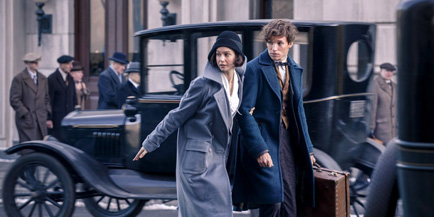|
|
Movie Review: Fantastic Beasts and Where to Find ThemBy Ben GruchowNovember 21, 2016
Yates handles this material with care and respect, and it lets us give him a little bit of leeway when it comes to addressing the matter of the Obscurus, and the member of the Magical Congress involved in bringing about the movie’s final chain of events. We are given the skeleton of motivation for Newt and co. in how they approach these set pieces, and there is a powerful blend of painful imagery and sympathetic wording toward the end that works entirely on its own terms. Still, this particular storyline never exactly finds the right rhythm to land on, and it works mostly by virtue of solid work by the cast: by Waterston, by Ezra Miller as a troubled orphan, and by Redmayne. This incarnation of Newt Scamander is a more impressive thing than it might seem; the screenplay by Rowling gives his dialogue the proper twist toward the absurd that she likes to employ in all of her Potter-based work, but it’s to the credit of the actor that we find the rest of the components in making Newt a protagonist that constantly straddles the line between endearing and madman: the awkward and tentative gait, the subtle inflection he gives to his lines, and the tendency of his eyes to dart around and his face to assume an expression that half-suggests there’s a joke about to land that only he knows about. Redmayne’s Scamander is the biggest strength of the film. It is perhaps the greatest weakness of Fantastic Beasts and Where to Find Them that there is little to no consideration given for newcomers to this storytelling world; I mentioned before about how lost you’d be if you walked into the auditorium without having read or seen any of the prior source material, and perhaps the film should be criticized on those grounds in a vacuum. But the movie is at least gentle and good-natured about its many convolutions of the wizarding world. And we live in a time of fan-service and nostalgia and Member Berries; if I don’t care much for the overall form, it is nice to see as lively and organic an example as we see here. It closes on a promising note, and I’m truly looking forward to what happens next; that’s about as ringing a recommendation as you can find in this genre.
|

|
|
|

|
Friday, November 1, 2024
© 2024 Box Office Prophets, a division of One Of Us, Inc.


